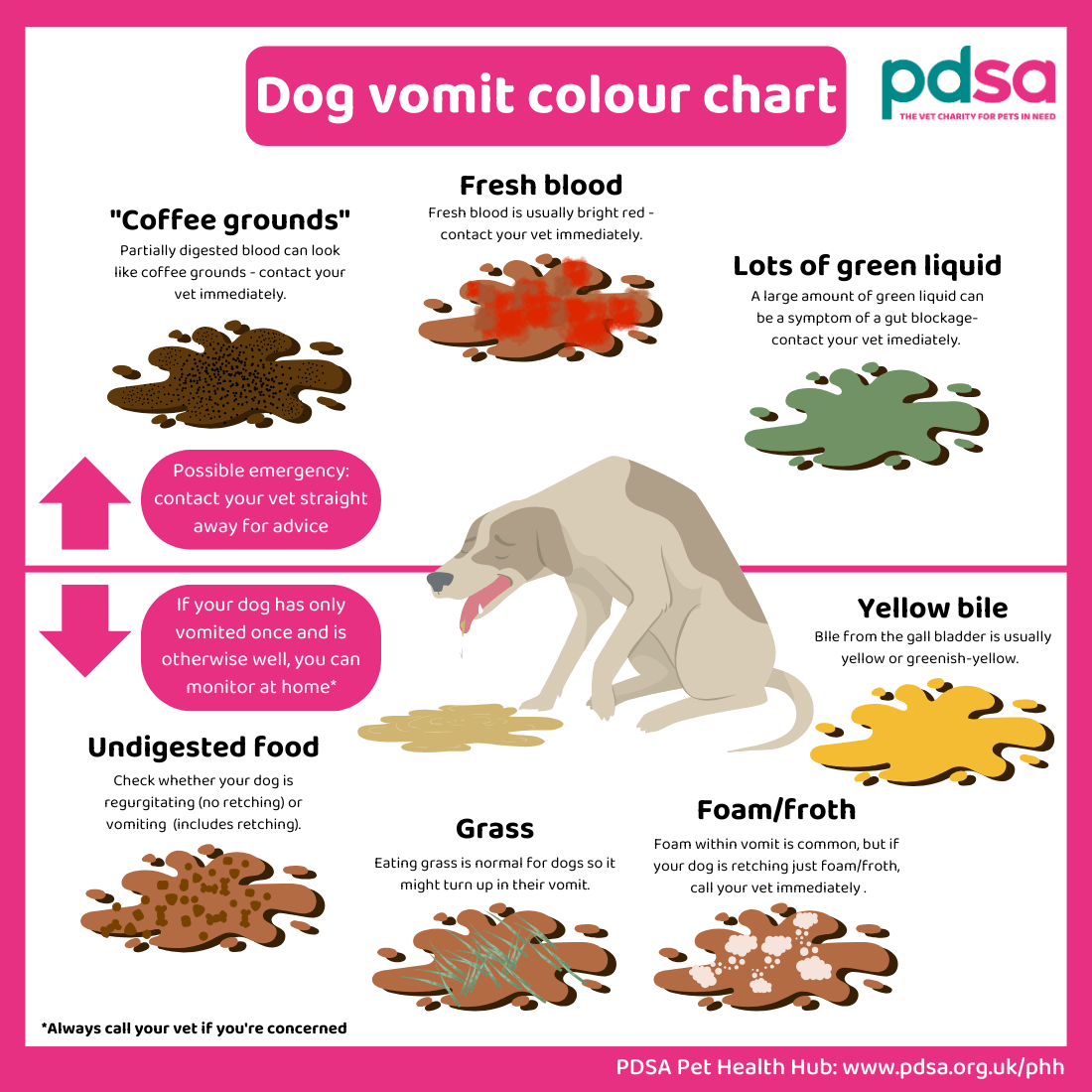Vomiting in dogs
Overview
- Vomiting in dogs is a common problem, and it can be caused by many different things – some minor and some much more serious.
- Although most cases of vomiting in dogs are mild and simple to treat, it’s important to monitor for symptoms of a more serious problem developing and contact your vet straight away if you’re concerned.
What causes vomiting in dogs?
There are many different things that can cause vomiting in dogs, including:
- Gastritis (inflammation of the stomach)
- Gastroenteritis (inflammation of the stomach and guts)
- Haemorrhagic gastroenteritis (HGE)
- Parvovirus
- Eating something harmful/poisonous
- A gut blockage
- Twisted stomach (GDV) - this is an emergency
- Worms
- Travel sickness
- Food allergies
- Pancreatitis (inflammation of the pancreas)
- Infected womb (pyometra)
- Vestibular disease (a problem with the balance system inside the ear)
- Medication reaction/side effect
- Liver disease
- Kidney disease
- Addison’s disease
- Diabetes Gut ulcers (rare)
When to contact your vet
If your dog is normally fit and well, has only vomited once and seems otherwise fine in themselves, it may not be necessary to contact your vet immediately. However, you’ll need to monitor them closely and contact your vet for advice if they continue to vomit, or develop any of the symptoms below:
- Continuous vomiting
- Blood in their vomit
- Bloody diarrhoea
- Diarrhoea (without blood) lasting for more than two to three days
- Low energy (lethargy)
- A painful abdomen
- Disorientation or collapse
- Signs of dehydration (sticky gums and/or sunken eyes)
- Continuous retching and/or a bloated tummy – these can be symptoms of a GDV (twisted stomach) which is a life threatening emergency
Home remedies for vomiting in dogs
If your dog has only vomited once and seems otherwise well, you may decide to wait and see if they vomit again before taking them to the vets. Here are a few things you can try at home during that time:
- A bland diet: Give your dog small portions of a highly digestible low fibre, low fat diet regularly throughout the day. Avoid any rich or fatty foods. Commercially made bland diets are available to buy (contact your vet for more information), or alternatively, you could try plain boiled rice with cooked chicken breast or white fish. Once your dog has stopped vomiting, you can slowly start to re-introduce their normal food again over a period of two to three days.
- Keep them hydrated: Your dog will need to drink more than usual to replace what they’ve lost in their vomit. Provide plenty of fresh water and make sure your dog is drinking little and often throughout the day.
- Rest: Let your dog rest (no walks) to help them recover, and prevent the potential spread of any illness they might be carrying.
Call your vet for advice if your dog continues to vomit, doesn’t seem right after 24 hours, or gets worse at any point.
Dog vomit colour chart
Vomit can contain a number of things, including:
- Bile (stomach acid) - this is usually green or yellow and often foamy.
- Food – can be undigested or digested and any colour (often brown).
- Blood –can be red, black, brown or if it’s partially digested, often looks like coffee grounds. Contact your vet immediately if you notice blood in your dog’s vomit.
- Grass – dogs often eat grass, especially if they’re feeling sick.

How to tell the difference between vomiting, retching and regurgitating
Although similar, vomiting, retching and regurgitation are all caused by different things, so being able to tell them apart is very useful.
- Vomiting: This is when a dog feels nauseous (sick), retches and brings up the contents of their stomach. If your dog is vomiting, it’s common for them to have other signs of illness such as low energy and reduced appetite.
- Retching: Retching without vomiting is when a dog gags and heaves as if they are going to be sick, but then very little material, if any, is brought up. A single retch is usually nothing to worry about, but continuous retching can be a sign of a GDV (twisted stomach) which is a life-threatening condition.
- Regurgitation: This is when a dog brings up undigested food, with no retching, heaving or signs of feeling sick. Regurgitation usually happens quite soon after eating, and as a one-off can simply mean your dog has eaten too fast. However, it can also be caused by certain health conditions such as megaoesophagus, and gastroesophageal reflux disease (GERD) which is most commonly seen in shorter-faced (brachycephalic) breeds like French Bulldogs. If your dog regurgitates regularly, or you’re worried, you should make an appointment to see your vet.
What should I do if my dog is trying to be sick but not producing anything?
If your dog is continuously trying to be sick, but not producing anything (known as retching) you need to contact your vet immediately, especially if they also have a bloated stomach. Retching and/or bloat can be a sign of a GDV (gastric dilatation volvulus/twisted stomach) which is a life-threatening emergency.
Published: October 2024
Did you find this page useful?
Tell us more
Please note, our vets and nurses are unable to respond to questions via this form. If you are concerned about your pet’s health, please contact your vet directly.
Thank you for your feedback
Want to hear more about PDSA and get pet care tips from our vet experts?
Sign up to our e-newsletter
Written by vets and vet nurses. This advice is for UK pets only. Illustrations by Samantha Elmhurst.

